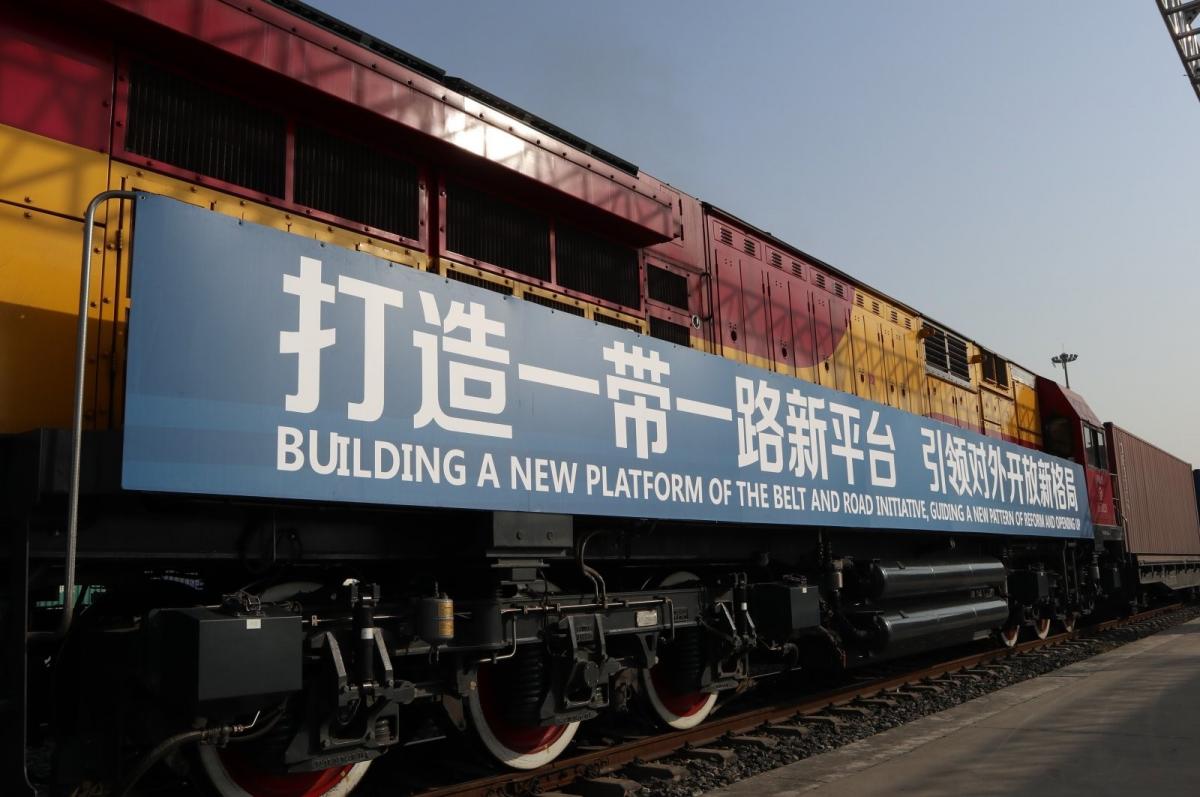On December 23, 2020, Russian daily Izvestia published an article, titled "Oriental Rapprochement: Turkey And China Are Now Linked By Rail; It Is Considered The Shortest And Most Convenient Route Between Asia And Europe," saying Turkey was bypassing Russia in the building of transport corridors.
A freight train left Istanbul on December 4, 2020, and, moving along the Trans-Caspian transport route, arrived in China on December 19, 2020. Commenting on the event, the Chinese government-owned media outlet CGTN emphasized the role of Azerbaijan in the building of this transport corridor: "The importance of the event lies in the fact that this is the first time that a Turkish train set out on this route. Until now, the communication was carried out only in the opposite direction – from China to Turkey...
"And all this became possible thanks to the missing link – the Baku–Tbilisi–Karss corridor, built on the initiative of Azerbaijan. The implementation of this project, which is the shortest rail link between China and Europe, creates more favorable opportunities for transporting goods to Europe, mainly from areas located in the western part of China. Transporting goods to Europe in this way helps to reduce wasted time and transportation costs. Given all these advantages, China attaches great importance to the Azerbaijani corridor. Chinese transit countries and manufacturers through Azerbaijan get faster access to Europe."[1]
Describing Turkey-China relations, Izvestia wrote that Turkey has been of interest to Chinese foreign policy strategists since the 19th century. The article added that "China has become Turkey's second import partner after Russia" and that Turkey, in cooperating with China in the building of the "One Belt One Road" line across its territory, is looking to strengthen its influence not only as a supra-regional actor, but as a world center of power.

(Source: Twitter.com/akaraismailoglu)
Following are excerpts from the Izvestia article:[2]
"'Izvestia' Reports On The Specifics Of The Relations Between Beijing And Ankara Taking Place Behind Moscow's Back"
"Ankara continues to build transport corridors bypassing Russia. The first freight train from Turkey arrived in China, having passed through the Middle Corridor of the 'Silk Railway.' Experts are confident that this is the shortest and most convenient rail route between Asia and Europe. Izvestia reports on the specifics of the relations between Beijing and Ankara taking place behind Moscow's back.
"The first freight train from Turkey to China arrived at its destination, leading Turkish media reported, calling it a historic journey. The train set off from Istanbul on December 4 [2020] and reached Xi'an, China two weeks later, having covered 8,693 kilometers (5,402 miles) as it passed through two continents, two seas and five countries.
"The 754 m long train carried household appliances. 'This is our victory in railway transportation,' reacted Adil Karaismailoğlu, Minister of Transport and Infrastructure of Turkey. This was the first journey through the Middle Corridor of the Silk Railway. 'Turkey will continue to take the necessary steps to further strengthen ties between East and West and strengthen its central position in the region,' the Turkish Foreign Ministry noted.

The Turkish export train completed its journey from Turkey to China in the city of Xi'an, China, on December 19, 2020 (source: IHA Photo).
"Turkey Has Been Of Interest To Chinese Foreign Policy Strategists Since The 19th Century"
"The new rail project, of course, did not come out of nowhere. Turkey has been of interest to Chinese foreign policy strategists since the 19th century. For instance, the [Chinese] philosopher Tan Sitong in his book 'Theory of Benevolence' called for the creation of a pan-Asian alliance from Turkey to China. And in the second half of the twentieth century, Mao Zedong's in his theory of 'three worlds' assigned to Turkey an important role in creating a protection belt against the USSR, viewed by him as the main hegemonic force in the world, says Oleg Timofeev, a Sinologist and an expert in international relations.
"In the 1990s, however, relations between Beijing and Ankara were strained due to the Uyghur issue: practically all Turkish governments supported Uyghur separatism. Besides that, Turkish President Recep Tayyip Erdoğan quite often publicly criticized the Chinese authorities for oppressing the Uyghurs, and some of their separatist organizations are based in Turkey.
"But even despite that, active cooperation between Ankara and Beijing is ongoing. Arif Asalioğlu, Director General of the International Institute for the Development of Scientific Cooperation (MIRNAS), is confident that over the past 10 years, relations have reached the level of strategic partnership and 'Ankara is becoming Beijing's window on the Mediterranean.'
"For instance, China has become Turkey's second import partner after Russia. Beijing is actively investing in the Turkish economy. Over the past three years, the Chinese authorities have invested $3 billion and they are planning to double that amount. In 2018, when amid the crisis in relations between Ankara and Washington, the Turkish Lira was depreciated by 40%, Beijing provided Turkey with a $3.6 billion loan. During the implementation of the 'Silk Railway' project, Turkey also received $5 billion from China. Beijing supports the infrastructure projects of the Turkish leader: Chinese companies own 65% of the Kumport container terminal in Istanbul, as well as 51% of the Yavuz Sultan Selim Bridge. 'China has provided $1.7 billion to build the Hunutlu coal-fired power plant in the Mediterranean, which is expected to meet 3% of Turkey's electricity needs. Ankara is negotiating with the State Nuclear Energy Technology Company of China to sign an agreement on the construction of the third nuclear power plant in the country,' Asalioğlu explained.
"In addition, in 2017, the parties signed an agreement that provides for the extradition of criminals, even if the crime is only punishable in one of the countries. A year ago, hundreds of Uyghurs were arrested in Turkey and sent to repatriation centers. That is to say, Ankara began to secretly hand over the wanted Uyghurs to Beijing, despite the fact that the president had been trying for a long time to style himself as a defender of oppressed Muslims. [Since then] Erdoğan's statements on the oppression of the Uyghurs in the PRC have become more diplomatic. 'The Chinese took part in the 2018 Turkish military exercises in Ephesus. The share of Huawei's Chinese technology systems in the Turkish market increased from 2017 to 2019 from 3% to 30%. In 2016, ZTE, another Chinese tech company, acquired 48% of the Turkish telecom equipment provider Netaş. That company is managing telecommunication systems at Istanbul Airport and is responsible for digitization of national health systems,' noted Arif Asalioğlu...
"Turkey Is Trying To Explore All Avenues For Cooperation With China In Building The 'One Belt One Road' Line Across Its Territory In Order To Strengthen Its Influence"
"In the 2000s, the volume of bilateral trade amounted to about $1 billion, but by 2018 it had grown up to $23 billion. At the same time, one third of Turkey's total foreign trade deficit is with China that is over $55 billion...
"Turkey is trying to become a hub 'spanning the north, south, west, and east,' believes Vladimir Avatkov, senior researcher at the Russian Academy's National Research Institute for Global Economy and Foreign Relations and associate Professor at the Diplomatic Academy of the Russian Foreign Ministry.
"'The West needs Turkey either as a zone of instability to project this instability to the Caucasus, Central Asia, and the Middle East or as the center that projects instability and regional conflicts to the Middle East, Central Asia, and Transcaucasia. Turkey, in turn, is trying to avoid both these scenarios and strengthen itself as a hub,' he added. 'And that is why it acquires the Russian S400s, despite the threat of sanctions, and is trying to explore all avenues for cooperation with China in building the 'One Belt One Road' line across its territory in order to strengthen its influence as a supra-regional and even world center of power, which [Turkey] claims to be,' explained the political scientist in an interview with Izvestia."








